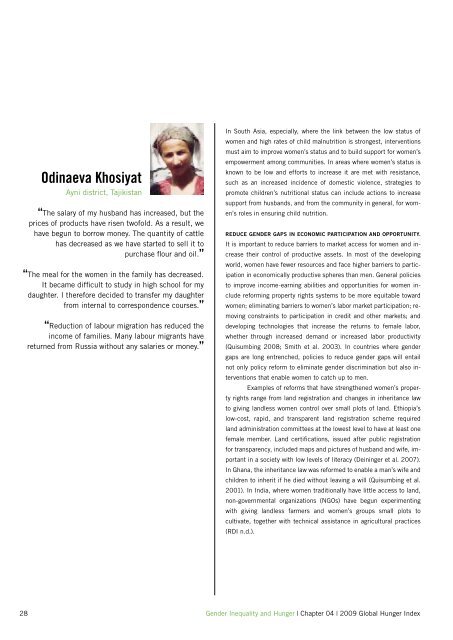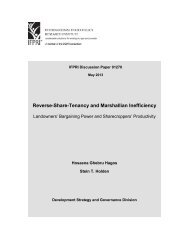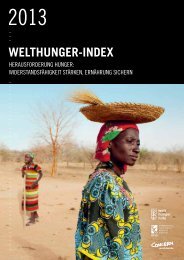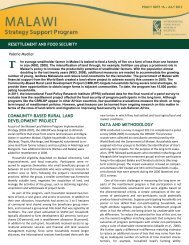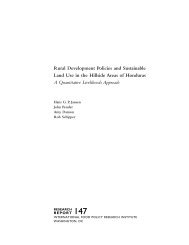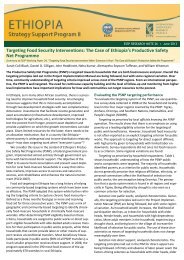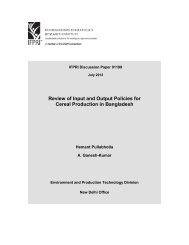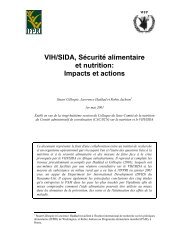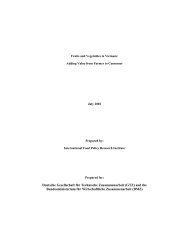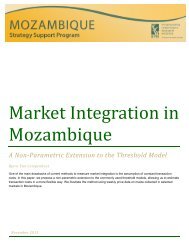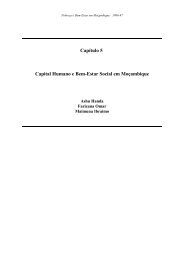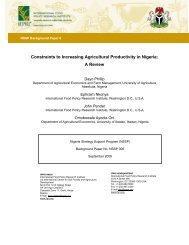2009 Global Hunger Index - International Food Policy Research ...
2009 Global Hunger Index - International Food Policy Research ...
2009 Global Hunger Index - International Food Policy Research ...
Create successful ePaper yourself
Turn your PDF publications into a flip-book with our unique Google optimized e-Paper software.
Odinaeva Khosiyat<br />
Ayni district, Tajikistan<br />
“The salary of my husband has increased, but the<br />
prices of products have risen twofold. As a result, we<br />
have begun to borrow money. The quantity of cattle<br />
has decreased as we have started to sell it to<br />
purchase flour and oil.”<br />
“The meal for the women in the family has decreased.<br />
It became difficult to study in high school for my<br />
daughter. I therefore decided to transfer my daughter<br />
from internal to correspondence courses.”<br />
“Reduction of labour migration has reduced the<br />
income of families. Many labour migrants have<br />
returned from Russia without any salaries or money.”<br />
In South Asia, especially, where the link between the low status of<br />
women and high rates of child malnutrition is strongest, interventions<br />
must aim to improve women’s status and to build support for women’s<br />
empowerment among communities. In areas where women’s status is<br />
known to be low and efforts to increase it are met with resistance,<br />
such as an increased incidence of domestic violence, strategies to<br />
promote children’s nutritional status can include actions to increase<br />
support from husbands, and from the community in general, for women’s<br />
roles in ensuring child nutrition.<br />
REDUCE GENDER GAPS IN ECONOMIC PARTICIPATION AND OPPORTUNITY.<br />
It is important to reduce barriers to market access for women and increase<br />
their control of productive assets. In most of the developing<br />
world, women have fewer resources and face higher barriers to participation<br />
in economically productive spheres than men. General policies<br />
to improve income-earning abilities and opportunities for women include<br />
reforming property rights systems to be more equitable toward<br />
women; eliminating barriers to women’s labor market participation; removing<br />
constraints to participation in credit and other markets; and<br />
developing technologies that increase the returns to female labor,<br />
whether through increased demand or increased labor productivity<br />
(Quisumbing 2008; Smith et al. 2003). In countries where gender<br />
gaps are long entrenched, policies to reduce gender gaps will entail<br />
not only policy reform to eliminate gender discrimination but also interventions<br />
that enable women to catch up to men.<br />
Examples of reforms that have strengthened women’s property<br />
rights range from land registration and changes in inheritance law<br />
to giving landless women control over small plots of land. Ethiopia’s<br />
low-cost, rapid, and transparent land registration scheme required<br />
land administration committees at the lowest level to have at least one<br />
female member. Land certifications, issued after public registration<br />
for transparency, included maps and pictures of husband and wife, important<br />
in a society with low levels of literacy (Deininger et al. 2007).<br />
In Ghana, the inheritance law was reformed to enable a man’s wife and<br />
children to inherit if he died without leaving a will (Quisumbing et al.<br />
2001). In India, where women traditionally have little access to land,<br />
non-governmental organizations (NGOs) have begun experimenting<br />
with giving landless farmers and women’s groups small plots to<br />
cultivate, together with technical assistance in agricultural practices<br />
(RDI n.d.).<br />
28 Gender Inequality and <strong>Hunger</strong> | Chapter 04 | <strong>2009</strong> <strong>Global</strong> <strong>Hunger</strong> <strong>Index</strong>


